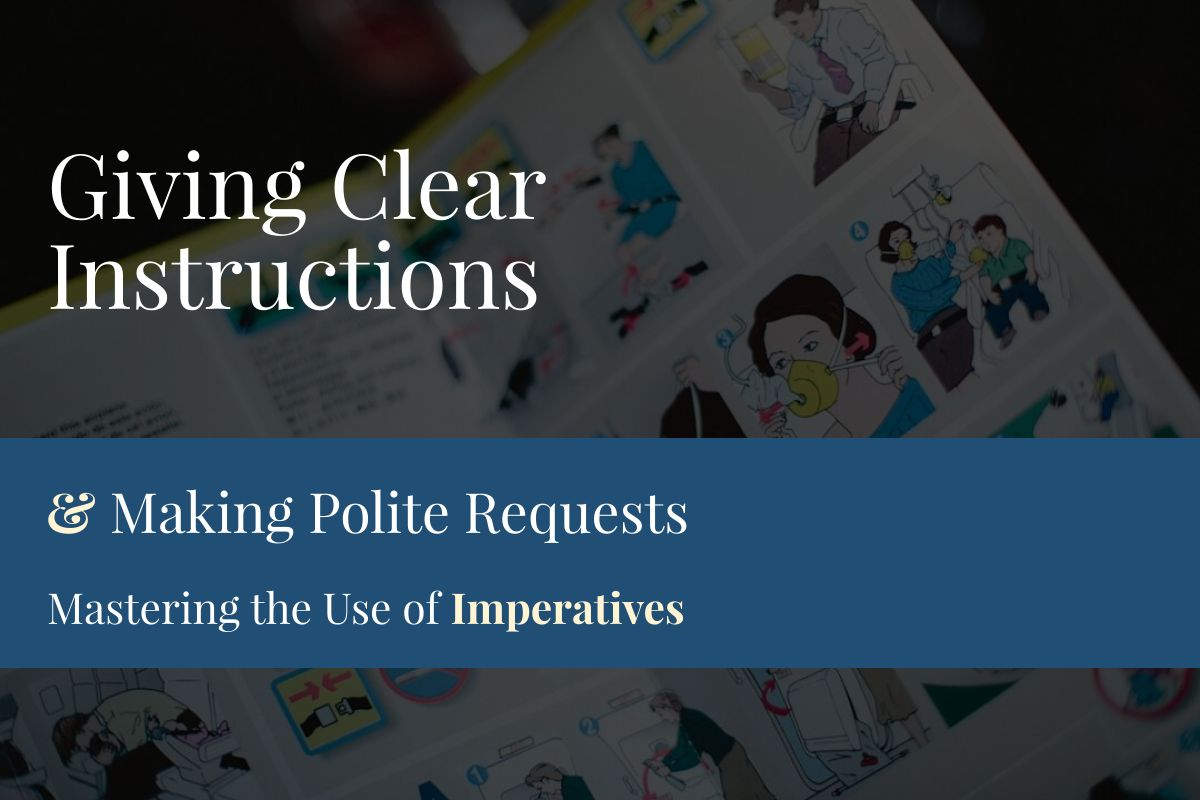
Mastering the Use of Imperatives: Giving Clear Instructions and Making Polite Requests in English
Introduction
Imperatives play a crucial role in English as they are used to give commands, offer advice, extend invitations, and make requests. By understanding how to use imperatives effectively, you can communicate your ideas clearly and politely.
Giving Instructions
When it comes to giving instructions or directions, imperatives are commonly used. For example:
- Answer the questions.
- Read the instructions carefully.
- Press the button to start.
Offering Advice
Imperatives are also used to provide advice or suggestions. For example:
- Stay inside the car.
- Take deep breaths to calm down.
- Exercise regularly to stay healthy.
Giving Orders
Direct orders or commands can be expressed using imperatives. For example:
- Be quiet!
- Close the door.
- Don’t touch that!
Extending Invitations
Imperatives are useful for inviting someone to do something. For example:
- Come in and have a coffee.
- Join us for dinner.
- Dance with me.
Making Requests
While it is preferable to use other structures for making requests, imperatives can still be used politely in certain situations. For example:
- Please put your bag over there. (polite imperative)
- Could you put your bag over there? (more polite request)
- Would you mind putting your bag over there? (very polite request)
Note: It is important to be considerate and use imperatives for requests carefully.
Formation
To form imperatives:
- Use the base form of the verb without the subject pronoun “you”. For example:
- Lie down on the ground. (NOT: You lie down on the ground.)
- Negative imperatives are formed by adding “don’t” (do not) before the base form of the verb. For example:
- Don’t stand near windows.
- To emphasize habits or behaviors, “always” and “never” can be used at the beginning of an imperative phrase. For example:
- Never take an elevator.
- Always stay where you are.
By understanding and using imperatives correctly, you will be able to give clear instructions, provide advice, give orders, extend invitations, and make requests effectively in English. Remember to consider the context and the level of politeness required in different situations.
Conversation Example: Making an Invitation
Ahmed: Hi, Emily! I’m planning to have a small gathering with some friends to celebrate finishing our exams. Would you like to join us?
Emily: Oh, that sounds wonderful, Ahmed! I would love to join you. When is the gathering?
Ahmed: It’s happening this Friday evening at my place. We’ll have some snacks, play games, and just have a good time.
Emily: Great! Can you give me some directions to your place?
Ahmed: Sure! When you reach the main road, turn left and continue straight until you see the big supermarket. Once you pass the supermarket, take the second right, and my building is the fourth one on the left.
Emily: Alright, got it! I’ll make sure to bring some snacks to share with everyone.
Ahmed: That’s very kind of you, Emily. Thank you! Oh, and when you arrive, please knock on the door and come in. We’ll be waiting for you.
Emily: No problem, Ahmed. I’ll be there on time. Should I bring any board games or anything else?
Ahmed: That would be fantastic! If you have any favorite board games, please bring them along. It will make the evening even more enjoyable for everyone.
Emily: Sounds like a plan, Ahmed. I’m looking forward to Friday evening. Thank you for inviting me!
Ahmed: You’re welcome, Emily. It’s going to be a fun evening with good company. See you then!
This conversation showcases the use of imperatives in making invitations and providing instructions in a friendly and polite manner.
Notes
Cultural Sensitivity
Different cultures have different communication styles, so it is essential to be mindful of cultural differences when using imperatives, especially in international settings. For example, in some cultures, it’s better to say “Could you please close the window?” instead of “Close the window.”
Politeness Strategies
To convey politeness, it is important to use polite words like “please” when using imperatives. Polite language shows respect and consideration for others. Examples include: “Please pass me the book” and “Would you mind giving me a hand?”
Imperatives in Different Situations
Different situations require different types of imperatives. For example, in an emergency, urgent and direct imperatives like “Call 911!” are used. In instructional manuals, imperatives are more instructional and straightforward, such as “Press the red button to start.”
Non-verbal Imperatives
Imperatives can also be communicated without words through body language, gestures, and facial expressions. Examples include pointing to a chair to indicate “Sit down” and raising your hand with the palm facing outward to signal “Stop.”
Practice Activities
Here are some activities to help you practice using imperatives:
- Fill in the blank: Close the door after you enter. Tidy up your room before leaving.
- Role-play: Pretend you are a teacher and give instructions to a student. Act out a scenario where you invite a friend to a party using imperatives.
Common Errors and Pitfalls
Avoid these common mistakes when using imperatives:
- Remember to include the subject “you” in the imperative sentence. Incorrect: “Stand up!” Correct: “You stand up!”
- Be careful with verb forms. Use the base form of the verb in imperatives. Incorrect: “Running to the finish line!” Correct: “Run to the finish line!”
Relationship Dynamics
The formality and familiarity of your relationship with the listener influence how you use imperatives. Consider the context and adapt the level of politeness accordingly when giving commands or requests. For example, among close friends: “Pass the popcorn, please.” In a formal setting: “Would you kindly complete the forms?”
Polite Alternative Structures
In situations where politeness is preferred, consider using alternative structures instead of direct imperatives. For example, say “Would you mind turning down the music, please?” or “Could you please help me with this task?”
By mastering imperatives, you can give clear instructions, make polite requests, and effectively communicate your needs. Remember to be culturally sensitive, use polite strategies, and adapt to different contexts. Practice using imperatives in everyday situations to improve your English communication skills.
“Mastering the use of imperatives allows for clear and effective communication in English. It empowers individuals to give instructions, make requests, and engage confidently with others.”
